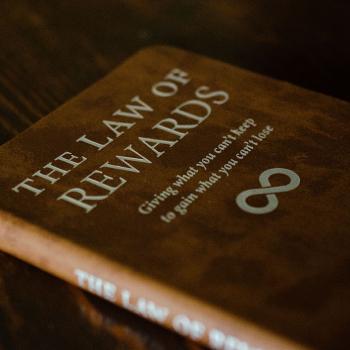
If I had any doubts about whether people are genuinely interested in learning about and applying God’s perspective on finances, they ended late in 2001 when my little book The Treasure Principle: Discovering the Secret of Joyful Giving was published. It immediately went through eight printings and sold more than 200,000 copies within ten months. Amazed observers asked, “Are people really that interested in giving?”
The answer is yes.
The Treasure Principle addresses only one aspect of stewardship, but we desperately need to see the full biblical picture to inform and correct our faulty view of the world. The positive response to my book Money, Possessions, and Eternity, which presents a comprehensive treatment of Christian stewardship and was first published in 1989, has also been a great encouragement. I have received countless letters and emails telling me how people have been liberated to a new joy in their Christian lives.
A reader wrote on Facebook, “Read this book years ago! There are a handful of books in our lives that we can say are life changing. For me the Bible is #1…and this book would be #2. Your book Heaven is probably #3. Thank you for your ministry!”
One man told me that the book helped him choose to move from his position as CEO of a major company to work in a missions organization. Another man told me he has given millions of dollars to God’s kingdom as a result of God speaking to him through the book. Pastors have written to say how their lives and their churches have been changed. This is a tribute not to my insight, but to the power of the Scriptures to change our perspective. (And years later, my book Managing God’s Money was released, which is a simplified and abridged version of Money, Possessions, and Eternity)
A Biblical Education on Money Matters
Some churches use one of my books on stewardship for group study. Others use them to train new church members. However, despite the availability of excellent stewardship study materials—including publications from Crown Financial Ministries—only 10 percent of churches have active programs that teach biblical financial and stewardship principles. Only 15 percent of pastors say they have been equipped by their denomination or seminary to teach biblical financial principles. Only 2–4 percent of seminaries offer courses, seminars, or Bible studies to teach stewardship principles, and only 1–2 percent of Christian colleges offer such training.
It’s remarkable that something so central to the teaching of Scripture—money is referenced at least 800 times—is so neglected by schools dedicated to teaching the Scriptures and preparing students to train others. I wrote Money, Possessions, and Eternity for just that reason; to help close the gap between Scripture’s teaching about money and our education about money.
I’ve learned a great deal more since writing the original edition and its revised and updated version. But what’s most important hasn’t changed at all—God and His Word, which have a power and authority far beyond my own. I cite Scripture often throughout the book, so that even if my opinions are incorrect, readers can draw their own conclusions from the truth itself. I cannot be certain of all my insights, but I am absolutely certain of God’s.
Where Rubber Meets the Road
When I wrote the original edition of Money, Possessions, and Eternity, I was a local church pastor. I knew that this subject matter had gripped me and changed my family’s life–but I had no idea what would happen less than a year after the book came out. Our family’s belief in the truths presented in the book was tested in ways we never could have predicted. Through trials requiring every ounce of faith, we found those truths about God and His provision to be rock-solid.
I pray your heart will be touched and your life forever changed, as mine has been, through studying and applying Scripture’s exciting perspectives on money, possessions, and eternity.
A.W. Tozer wrote, “The man of pseudo faith will fight for his verbal creed but refuse flatly to allow himself to get into a predicament where his future must depend upon that creed being true. He always provides himself with secondary ways of escape so he will have a way out if the roof caves in. What we need very badly these days is a company of Christians who are prepared to trust God as completely now as they know they must do at the last day.”
Books on giving and stewardship trespass on enemy territory. They invade the turf of a powerful adversary, attempting to cross a war zone laced with mines. In writing them I sought to recover strategic territory that rightly belongs to our true King.
Satan is the Lord of Materialism. “Mammon” is but an alias of the Prince of Darkness, who has a vested interest in whether or not we understand and obey Christ’s commands concerning money and possessions. The Enemy will not give ground without a fight.
Our use of money and possessions is a decisive statement of our eternal values. What we do with our money loudly affirms which kingdom we belong to. Whenever we give of our resources to further God’s kingdom, we cast a ballot for Christ and against Satan, for Heaven and against Hell. Whenever we use our resources selfishly and indifferently, we further Satan’s goals.
Don’t Believe the Lie
The key to a right use of money and possessions is a right perspective—an eternal perspective. Each of our lives is positioned like a bow, drawn across the strings of a cosmic violin, producing vibrations that resound for all eternity. The slightest action of the bow produces a sound which is never lost. My choices today have a tremendous bearing on eternity. Indeed, it is the stuff of which eternity is made.
The game becomes only more serious as the stakes are raised—or when we begin to realize how high the stakes already are. Far too many evangelical Christians have succumbed to the heresy that this present life may be lived disobediently without serious effects on their eternal state. Never have so many Christians believed the lie that their money and possessions are theirs to do with as they please. Never have so many thought that as long as they affirm with their lips a certain doctrinal statement, they may live their lives indifferent to human need and divine command, and all will turn out well in the end.
God’s Word is grain; our word is straw. His Word is the fire that consumes and the hammer that breaks (see Jeremiah 23:28-29). Judge what I’ve written, not in the light of prevailing opinion, but in the light of God’s Word. A. W. Tozer said, “Listen to no man who has not listened to God.” To the degree that my words do not match up to Scripture, they are worthless. To the degree that they stand up under the scrutiny of God’s Word, they should be taken seriously.
The best way to check our heart’s attitude regarding material possessions is to allow all the principles of God’s Word to penetrate our innermost being. “The word of God is living and active. Sharper than any double-edged sword, it penetrates even to dividing soul and spirit, joints and marrow; it judges the thoughts and attitudes of the heart” (Hebrews 4:12).
Photo: Unsplash













